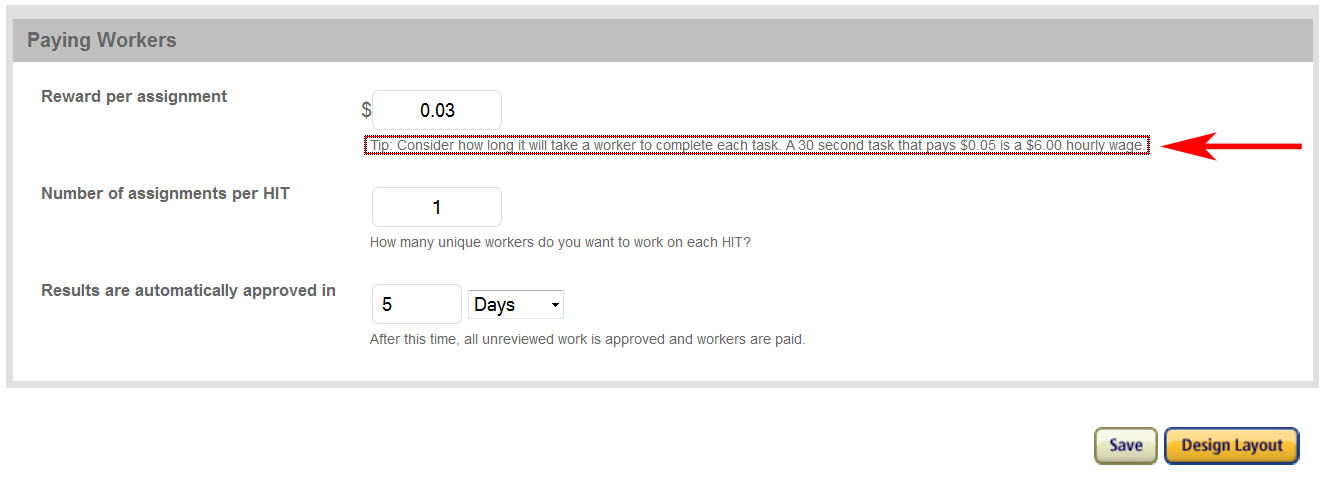 Since 2007, the US federal minimum wage has been set at $7.15 an hour, yet workers on Amazon’s Mechanical Turk—many of whom live in the US—make an average of $2 (according to the estimates of Mechanical Turk researcher Alex Quinn). As illustrated in the above image, Amazon, itself, encourages businesses (at least implicitly) to pay workers (or “turkers” as they are called) less-than-minimum wages. Moreover, to even qualify for these low-paying tasks called HITs (Human Intelligence Tasks), turkers are often expected to complete unpaid training sessions that can last for up to an hour. Also, because turkers receive micro-payments for each task and because the time to completion for each task is rationalized to the second, turkers receive no pay during normal periods of rest during the workday.
Since 2007, the US federal minimum wage has been set at $7.15 an hour, yet workers on Amazon’s Mechanical Turk—many of whom live in the US—make an average of $2 (according to the estimates of Mechanical Turk researcher Alex Quinn). As illustrated in the above image, Amazon, itself, encourages businesses (at least implicitly) to pay workers (or “turkers” as they are called) less-than-minimum wages. Moreover, to even qualify for these low-paying tasks called HITs (Human Intelligence Tasks), turkers are often expected to complete unpaid training sessions that can last for up to an hour. Also, because turkers receive micro-payments for each task and because the time to completion for each task is rationalized to the second, turkers receive no pay during normal periods of rest during the workday.
Mechanical Turk is a crowdsourcing platform that allow anyone to recruit laborers for short online tasks, which cannot be effectively completed by computers. For examples, turkers might compile contact information for various businesses, sort through images and tag offensive ones, or participate in university research experiments. Because of the piecemeal and spatially-disembedded nature of the work, it is virtually unregulated.
Can we simply dismiss this subversion of labor laws—as some commentators have—on the grounds that “$2 an hour is a decent wage in India?” Even if we are angered by this exploitation of turkers, is it even possible to regulate an international platform of this sort?

Comments 2
nathanjurgenson — May 26, 2011
but of course so many websites pay less than 2$/hr for content, most ask for content for no wages at all. facebook asked its users to translate materials for the site into different languages, and they gladly obliged. the wikimedia company clearly uses the branding of wikipedia to make money. and even more trivial activities such as writing a review on yelp and amazon is free labor with no pay.
what i think is interesting is that the exploitation becomes MORE clear once payment is introduced in the first place. i take this issue on in my post asking "What if Facebook Paid Us?", and argue that once payment is introduced we are forced to acknowledge that social media is indeed a capitalist enterprise. the post is here: http://thesocietypages.org/sociologylens/2010/07/02/what-if-facebook-paid-us/
PJ Patella-Rey — May 26, 2011
Absolutely. Mechanical Turk is an exception to the rule for production on social media. I have a more provocative post soon to come addressing exploitation on social media non-profits.